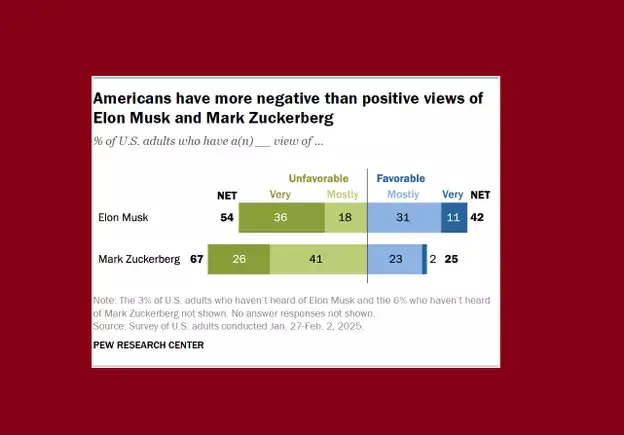In an age where technology plays a pivotal role in daily life, the individuals steering these technological giants inevitably attract attention—both admiring and critical. A recent Pew Research survey reveals a troubling trend for two of the industry’s most influential figures: Elon Musk, the owner of Twitter (now X), and Mark Zuckerberg, the chief executive of Meta. The changing public perception highlights a growing discontent among Americans, spawned from their actions, controversies, and the increasing visibility of their political involvements.
According to the findings, a notable 54% of U.S. adults harbor an unfavorable opinion of Musk, with 36% expressing strong disapproval. Conversely, Zuckerberg experiences even harsher condemnation, as two-thirds of respondents share a negative view of him, including 26% who feel very unfavorable. It is evident that while both men grapple with poor public sentiment, Zuckerberg’s backlash is broader in scope, albeit Musk’s dissenters appear particularly passionate about their disdain for him.
What accounts for this divergence? Musk has recently engaged in contentious political discourse, often making headlines for his unfiltered opinions on various subjects. His actions—ranging from family disputes to his tendency to express controversial positions—have contributed significantly to his unpopularity. On the other hand, Zuckerberg’s enduring criticism can be traced to longstanding issues surrounding data privacy and the ethical implications of his company’s algorithms, particularly those affecting adolescent users.
Both Musk and Zuckerberg wield considerable influence but often at the expense of public goodwill. Musk’s proclivity for transforming Twitter into his personal platform for communication, sometimes resulting in misinformation and divisive rhetoric, alienates a segment of his audience. His legal battles, careless behavior, and polarizing political support accentuate the ‘villain’ narrative surrounding him.
Zuckerberg, conversely, has faced backlash for Meta’s historic controversies, from data privacy infringements to the proliferation of harmful content on social media platforms. His investments, such as purchasing land in Hawaii, also draw ire from local communities, prompting accusations of wealth-driven insensitivity. These actions underscore a shared deficit in public trust, suggesting that while the two men’s paths to villainization differ, their impact remains equally significant.
As billionaires navigating the tech landscape, the consequences of their decisions ripple outwards, affecting society at large. Musk and Zuckerberg, despite often dismissing regulations as obstructive to progress, reveal a worrying trend: a willingness to pursue their ambitions without substantive regard for the ethical ramifications of their actions. This pursuit poses a risk, especially in a world where unchecked corporate power can result in harm to communities and society as a whole.
The decline in their approval ratings carries a crucial message: that public figures, particularly those wielding immense power, are not immune to scrutiny. Yet as the conversation around regulation intensifies, the possibility of striking a balance between innovation and community welfare cannot be overlooked. The challenge lies in ensuring that the drive for progress does not overshadow the ethical considerations that safeguard societal interests.
Musk and Zuckerberg’s trajectories evoke pivotal questions about the role of leadership in the tech industry. Can they pivot from being perceived as villains to respected innovators? That outcome largely hinges on their ability to reflect on their actions, engage with criticisms, and embrace accountability. As society grapples with the complex relationship between technology and ethics, ensuring that checks and balances remain intact will be vital to preventing history from judging these figures harshly. In this era of technological advancement, aspiring leaders must recognize that the legacy they leave behind will ultimately define their impact—balancing ambition with responsibility, and innovation with ethics, could very well chart a path toward redemption.


Leave a Reply
You must be logged in to post a comment.